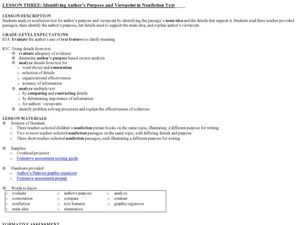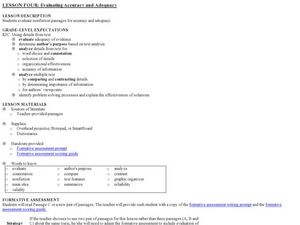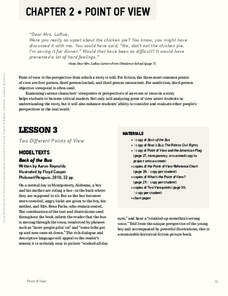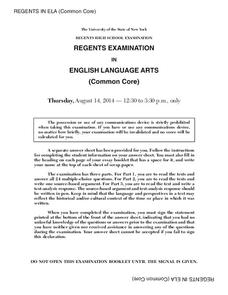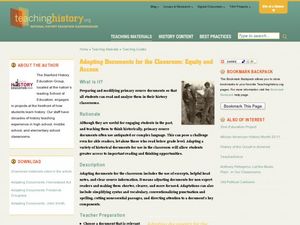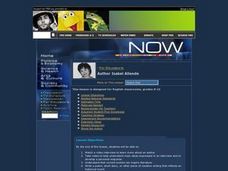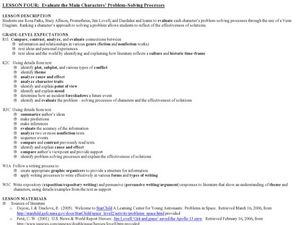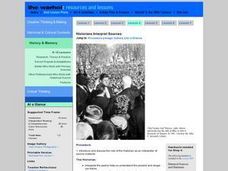Curated OER
Identifying Author’s Purpose and Viewpoint in Nonfiction Text
Why do people write books? Pupils discover how to identify the author's viewpoint. They read non-fiction passages their instructor selects (the plan has the class look at nonfiction children's picture books), and then identify the...
College Board
2003 AP® English Language and Composition Free-Response Questions
How does perspective change a person's view? Scholars view different perspectives as they compare the styles of two different authors describing a flock of birds. Writers also create essays in response to entertainment ruining society...
Curated OER
Evaluating Accuracy and Adequacy
Evaluate non-fiction works with your English class. While practicing a variety of strategies detailed in the plan, readers compare and contrast the information in three non-fiction passages about the same topic. They then discuss the...
Bill of Rights Institute
Preserving the Bill of Rights
Consider how America's founding fathers and their experiences contributed to the rights we all enjoy today. A collection of reading, writing, and collaborative exercises prompt high schoolers to think about the ways their current lives...
Curated OER
Post-Colonial Writers Unit
How do cultural and historical background impact thought? To explore this essential question, class members view of portion of the film, The Passage to India, read an excerpt from The Magician’s Nephew, and Nissim Ezekiel’s poem, "In...
Curated OER
Gender, Sex, and Slavery
While examining slavery's impact on women, historians compare and contrast the perspectives of a plantation mistress and an enslaved woman, both reflecting on the system of forced prostitution. Text analysis and written responses create...
Scholastic
Point of View
The point of view in a story can dramatically change the story itself. Focus on finding the points of view in various reading passages with a language arts packet, which includes fiction and nonfiction text.
New York State Education Department
English Language Arts Examination: August 2014
Tired of searching for complex passages suitable for high school level assessments? A challenging examination includes numerous complex text excerpts as well as question items to match them. Learners analyze literary elements, author's...
Curated OER
Adapting Documents for the Classroom: Equity and Access
Students examine primary sources to gain historical perspectives. For this historical analysis lesson, students analyze documents that their instructors have adapted to make more user-friendly. Example adapted primary documents are...
Curated OER
Choosing Words Carefully
Use literacy tools to select precise vocabulary. High schoolers respond to discussion questions that require them to consider the denotation and connotation of words. They then read non-fiction passages and identify words in the passages...
Curated OER
Identify Text Features in Nonfiction
What does a non-fiction text look like? Examine the text features of non-fiction. Middle and high schoolers read non-fiction passages provided by their instructor and analyze the texts for word choice, details, and organization.
Curated OER
Diction: Formal and Informal Language
Coke or Pepsi? Is it the taste or the advertising that determines preference? As part of a study of diction, class members examine two passages, one formal and one informal, about Coca-Cola and Pepsi. In addition, they consider word...
Curated OER
Finding Our Way Home: Immigration to the United States, 1815-1860
Students break into families of 4 members. They brainstorm issues that they would encounter as an immigrant family by creating a web. Students are given roles to research focusing on that perspective: father, mother, grandparent, and child.
Curated OER
Poet Naomi Shihab Nye
Students read and analyze poetry by Naomi Shihab Nye. They define stereotypes, view and discuss a video interview with Nye, present an oral reading of a poem, and write a persuasive letter to an author.
Curated OER
Effective Literary Analyses
Twelfth graders discuss a fictional text that they are given, they identify passages, which highlight the author's style, language naances and textual ambiguities. Pupils brainstorm possible topics for an analytical essay, they are...
Curated OER
Literature: Isabel Allende
Students watch and respond to a Bill Moyers Now video on the Chilean author, Isabel Allende. They brainstorm a list of recent events that might inspire writers and choose one to write about in poetic, diary, or short story form.
Curated OER
Identify and Evaluate Problem-Solving Processes and Solutions
Students identify a problem, the process by which it is solved, and the solution in a piece of literature. In this problem solving lesson, students read a nonfiction passage and use a think-pair-share strategy to identify the problem...
Curated OER
Evaluate the Main Characters? Problem-Solving Processes
High schoolers read passages from several sources and evaluate the text for various criteria. For this problem solving lesson, students evaluate character problem solving processes after reading passages. They will use a Venn Diagram to...
Curated OER
Constitutional Change During the Progressive Era
Young scholars analyze the passage of the 16th through 19th amendments during the Progressive Era around the turn of the century. Using research skills, they write papers and create portfolios supporting and opposing the adoption of...
Curated OER
Desert Views - First Impressions: Travelers on the Gila Trail
Students draw animals and plants that are described to them as they read passages of people who traveled across the Gila Trail in the Southwest. In this Gila Trail lesson plan, students also write a letter describing a plant or animal in...
Curated OER
How Does Ancestry Affect Folklore?
Students break into groups of 4 or 5 and choose an option to demonstrate a different cultural perspective in a fairy tale or other folklore that they are familiar. Possible choices are: PowerPoint presentation, video, digital...
Curated OER
Skellig
In this Skellig worksheet, students read to understand the works of David Almond and learn about his life. Students read eleven passages and then answer ten questions related to reading for meaning and understanding the author's craft.
Curated OER
Historians Interpret Sources
Students read excerpts from the historian Conover Hunt writing about John F. Kennedy and from primary source documents using the handout: Historical Sources and Historians. Students discuss and identify source types, evaluate sources,...
Prestwick House
Understanding Language: Slant, Spin, and Bias in the News
We live in a time of fake news, alternative realities, and media bias. What could be more timely than an activity that asks class members to research how different sources report the same topic in the news?


